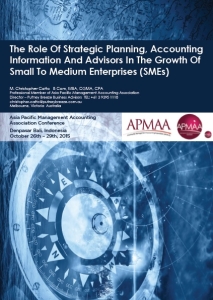In October 2015, Putney Breeze Business Advisors Director Chris Catto will be presenting a research paper on strategic planning and the growth of small to medium sized businesses (SME) that has been accepted by the Asia Pacific Management Accounting Association. (APMAA)
The paper examines the growth path of 54 SME‘s and the relationship between strategic planning and the use of accounting information.
The paper highlights the opportunities for providing business advisory services that leverage accounting information. The current changes in the competitive environment, in particular the influence of IT automation, outsourcing back office administration and the spectre of legislative changes to streamline tax compliance costs is putting pressure traditional accounting compliance business.
The opportunity for the traditional public accounting firm is to play a greater role in business performance improvement and offer advisory services that leverage accounting information.
A preview of the Paper’s abstract and introduction is below. The full paper will be made available in November
THE ROLE OF STRATEGIC PLANNING, ACCOUNTING INFORMATION AND ADVISORS IN THE GROWTH OF SMALL TO MEDIUM ENTERPRISES (SME)
Christopher Catto
B Com, MBA, CGMA, CPA
Professional Member of Asia Pacific Management Accounting Association
Director – Putney Breeze Business Advisors
TEL: +61 3 9395 1118
Abstract
This paper explores the association between, small to medium enterprise strategic planning, the use of accounting information systems and the role of accounting advisors in the growth of small to medium enterprises (SMEs). SMEs play a significant role in national economies across the globe, the body of research in the field of SME growth and the influence of management accounting in decision making is evolving. The nature of the SME operating environment with resources constraints contributes to the limited management accounting research in the niche. This paper considers the relationship between strategic planning and the use of accounting systems in decision making. The study of management accounting systems adoption is often linked with the use of budgets and forecasts in the business planning and reporting process. In this review, the paper examines the use of break-even analysis and gross margin reporting as a fundamental starting point of management accounting information. The qualitative data collected is from 54 SME’s through a series of interviews held in conjunction with consultative programmes. The paper considers contemporary SME life cycle literature and the use of accounting information and the implications of financial knowledge in the growth small to medium sized businesses. The results reveal that central to the growth of small to medium enterprises is the embeddedness of knowledge into organisational motor cognition. The study contributes to management accounting literature by examining the use and relationship of business knowledge derived from accounting systems information and management accounting systems in the planning and decision making process of established small to medium sized enterprises.
Keywords:
Small to Medium Enterprise, Management Accounting Systems, Management Accounting Information, Strategic Planning, Business Planning,
Introduction:
The growth and development of SMEs plays a vital role in the fortunes of national economies around the world. Small to Medium Enterprise (SMEs) employ approximately 70% of the Australian workforce (Davidsson, 2012) and contribute to 59% of the UK workforce. (Elster, 2013). The World Bank Groups, World Development Indicators survey of business entry density estimates that high income countries have up to approximately 3 times more businesses per 1000 people than low income countries. The success of small to medium size business has a direct impact on the development of standards of living for entire populations. Literature on the growth and success of SME start-ups has evolved from Gibrat’s economic assumptions, Penrose’s theory of knowledge accumulation and Greiner’s phased models to Osterwalder business model canvas. The link between growth and competence of entrepreneurs has also been explored by Ghoshal and Moran. The study of the use of management accounting information and the relationship with small business growth such as Davila’s research has linked the introduction of budgets and management control systems with the growth success of small firms. Research conducted by international accounting institutes has consistently aligned the development of accounting support with the growth of SME’s. The purpose of the paper is to gain greater insight on the practical purpose of accounting information in the SME environment. In particular the nature of management accounting information and how it is used in decision making that facilitates the growth and viability of an SME firm. Two hypothesis are explored in the paper are;
- Proposition 1 – The organisation of transferable tacit knowledge in a business enterprise is central to growth and viability. Informal business development and operational indicators derived from ad-hoc management accounting systems complement business tacit knowledge in SME decision making. Financial Accounting information plays a secondary role in SME decision making.
- Proposition 2 – The role of SME advisors is to complement knowledge gaps of an entrepreneur with specialized competencies.
Click on the link below to down load the booking form for the Maximise Your Advisory Income Master Class in Sydney on the 30th of November
Sales & Marketing for Public Acccountants


Leave A Comment